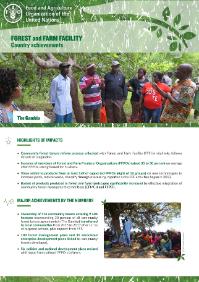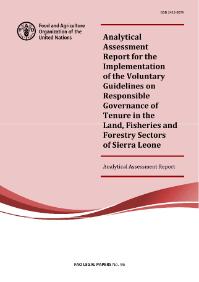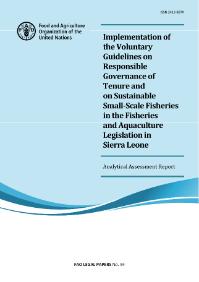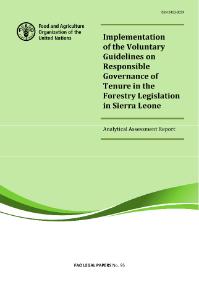Focal point
Location
The Food and Agriculture Organization of the United Nations leads international efforts to defeat hunger. Serving both developed and developing countries, FAO acts as a neutral forum where all nations meet as equals to negotiate agreements and debate policy. FAO is also a source of knowledge and information. We help developing countries and countries in transition modernize and improve agriculture, forestry and fisheries practices and ensure good nutrition for all. Since our founding in 1945, we have focused special attention on developing rural areas, home to 70 percent of the world's poor and hungry people.
Members:
Resources
Displaying 396 - 400 of 5074Forest and Farm Facility. Country factsheet
This factsheet gives a summary of FFF impact in The Gambia. Community forest tenure reform process unlocked with Forest and Farm Facility (FFF) in vital role; follows
decade of stagnation.• Incomes of members of Forest and Farm Producer Organizations (FFPOs) raised 35 to 50 percent on averageafter FFPOs strengthened for business.• Value added to products from at least half of supported FFPOs (eight of 16 groups) via new technologies toincrease yields, reduce waste, diversify through processing, reported since FFF activities began in 2013.Analytical assessment report for the implementation of the Voluntary Guidelines on Responsible Governance of Tenure in the land, fisheries and forestry sectors of Sierra Leone
This FAO Legal Paper is the overall synopsis of a series of legal assessment reports that evaluate the laws and policies in the land, forestry and fisheries sectors in Sierra Leone and make recommendations to align them with the Voluntary Guidelines on the Responsible Governance of Tenure of Land, Fisheries and Forests in the Context of National Food Security (VGGT), which were endorsed by the Committee on World Food Security in May 2012.
Implementation of the Voluntary Guidelines on Responsible Governance of Tenure and on sustainable small scale fisheries in the fisheries and aquaculture legislation in Sierra Leone
This FAO Legal Paper looks at and evaluates the present laws and policies relating to sustainable small-scale fisheries in the fisheries and aquaculture legislation in operation in Sierra Leone and makes recommendations to align them with the Voluntary Guidelines on the Responsible Governance of Tenure of Land, Fisheries and Forests in the Context of National Food Security (VGGT). This Paper provides a brief introduction of the fisheries sector in Sierra Leone, focusing on the small-scale sect or with an overview of the uses and access rights to resources.
Responsible governance of agricultural investments: a right to food perspective
In light of the endorsement of the Voluntary Guidelines on the Responsible Governance of Tenure of Land, Fisheries and Forests in the Context of National Food Security (VGGT), this Information Brief aims to provide concise and practical elements for a responsible governance of agricultural investments. Developed jointly with the FAO study The Right to Food and the Responsible Governance of Tenure: A dialogue towards implementation, this Information Brief offers a right to food perspective on a c rucial governance matter for the implementation of the VGGT.
Implementation of the Voluntary Guidelines on Responsible Governance of Tenure in the forestry legislation in Sierra Leone
This FAO Legal Paper looks at and evaluates the present forestry-related laws and policies in operation in Sierra Leone and makes recommendations to align them with the Voluntary Guidelines on the Responsible Governance of Tenure of Land, Fisheries and Forests in the Context of National Food Security (VGGT). Although still a new concept in Sierra Leone, there is increasing interest in the responsible governance of tenure in forestry and the significance of forests for the livelihood of rural p eople rather than exclusively for their commercial and industrial potential.











